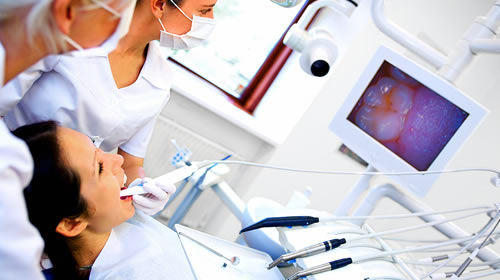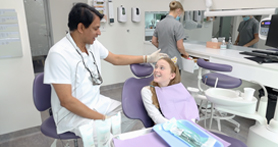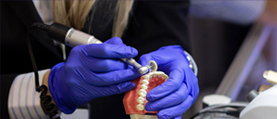Is it advisable to undergo tooth extraction if you are diabetic?
Teeth are meant to last a lifetime, but sadly that is not always the case. Teeth may be lost or require extraction for various reasons such as tooth decay, gum disease, trauma, improper alignment, or overcrowding. While tooth extractions are a common dental procedure, the decision becomes more complex when the patient is diabetic. Let’s explore the considerations, risks, and best practices for tooth extraction in diabetic patients.
What Is Diabetes?
Diabetes, or diabetes mellitus, is a chronic condition characterised by high blood sugar levels. It occurs either when the pancreas does not produce enough insulin (type 1 diabetes) or when the body becomes resistant to insulin (type 2 diabetes). Insulin is a crucial hormone that helps convert excess sugar in the blood into glucose, which is stored and used for energy. Without proper insulin function, blood sugar levels rise, leading to potential complications.
Common Symptoms of Diabetes:
• Increased thirst and hunger.
• Fatigue and unexplained weight loss.
• Slow healing of wounds due to impaired circulation.
• Nerve damage, kidney issues, and other systemic problems over time.
Tooth Extraction and Diabetes: What You Need to Know
Why Diabetes Affects Dental Health:
High blood sugar levels create an environment where bacteria thrive, particularly in the mouth. Diabetic patients are more prone to:
• Tooth decay: Excess sugar allows bacteria to erode enamel, leading to cavities.
• Gum disease: The infection weakens gum tissues, reducing tooth support.
• Slow healing:Reduced blood flow impairs the body’s ability to heal wounds efficiently.
Risks Associated with Tooth Extraction in Diabetics:
1. Slow Wound Healing: High blood sugar impairs blood clotting and delays the healing process.
2. Infection Risk: Reduced circulation and immune function make it easier for infections to take hold after surgery.
3. Bleeding: Uncontrolled diabetes may prolong bleeding post-extraction.
Preparing for Tooth Extraction as a Diabetic
Proper preparation is key to ensuring a safe and successful procedure.
1. Inform Your Dentist:
Always disclose your diabetic condition during the medical history discussion. This helps the dentist plan appropriately and take necessary precautions.
2. Blood Sugar Monitoring:
• Ensure your blood sugar levels are stable before the procedure. Most dentists prefer blood sugar levels below 234mg/dL (13mmol/L) to minimise risks.
• If your levels are high, the extraction may need to be postponed until stabilisation is achieved.
3.Medication Management:
• Follow your doctor’s advice regarding insulin or oral diabetes medications before surgery.
• Discuss adjustments to your diabetes management plan to accommodate fasting or eating restrictions related to the procedure.
4. Antibiotic Prophylaxis:
• In some cases, antibiotics may be prescribed before and after the extraction to prevent infections.
Is Tooth Extraction Safe for Diabetics?
Yes, tooth extraction is generally safe for diabetic patients if their blood sugar levels are well-managed. Studies show that diabetic patients who maintain good glucose control have healing times similar to non-diabetic individuals. The key is ensuring that the condition is stable and following all post-extraction care instructions.
Best Practices for a Safe Procedure:
• Choose the Right Timing: Schedule extractions when blood sugar levels are most stable, often early in the morning.
• Follow Pre-Procedure Instructions: Avoid eating or drinking before the procedure as instructed, while ensuring this aligns with your diabetes plan.
• Monitor Post-Procedure: Keep an eye on blood sugar levels as stress and medications may affect glucose levels.
Aftercare for Diabetic Patients Post-Tooth Extraction
1.Dietary Adjustments:
• Stick to soft, low-sugar foods during the healing period.
• Avoid hard, chewy foods that could disturb the surgical site.
2. Oral Hygiene:
• Gently rinse your mouth with warm salt water to keep the area clean and reduce swelling.
• Resume brushing and flossing after the initial healing period, avoiding the surgical area until instructed otherwise.
3. Medication Compliance:
• Continue taking prescribed antibiotics or painkillers as directed to prevent infection and manage discomfort.
4. Monitor Healing:
• Watch for signs of infection, such as swelling, redness, or excessive pain.
• Report any unusual symptoms to your dentist or doctor immediately.
Preventing Future Dental Issues for Diabetic Patients
To minimise the need for tooth extractions in the future, diabetic patients should prioritise oral health:
• Practice Excellent Oral Hygiene: Brush twice daily, floss, and use an antibacterial mouthwash.
• Manage Blood Sugar Levels: Consistently monitor and stabilise your glucose levels.
• Visit Your Dentist Regularly: Schedule check-ups every six months or as recommended to catch and treat issues early.
• Follow a Healthy Diet: Reduce sugary and high-carb foods that contribute to tooth decay and gum disease.
Conclusion
Tooth extraction is a common and generally safe procedure for diabetic patients when blood sugar levels are well-controlled. Proper preparation, clear communication with your dentist, and diligent aftercare are essential for successful outcomes. By managing diabetes effectively and maintaining good oral hygiene, you can minimise risks and enjoy better overall dental health. If you’re diabetic and considering a tooth extraction, consult your dentist and doctor to ensure a tailored and safe treatment plan.




